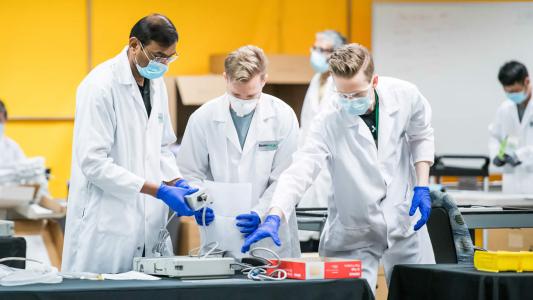Researchers at the University of Pittsburgh School of Medicine have announced the creation of a promising new coronavirus vaccine called PittCoVacc.
The team published a paper on the potential vaccine for the novel coronavirus in the peer-reviewed journal eBioMedicine on April 2.
According to that paper, when tested in mice, the vaccine prompted the creation of enough antibodies within two weeks to neutralize the coronavirus — an incredibly promising development in the battle against COVID-19.
Pitt’s New Coronavirus Vaccine
The purpose of a vaccine is to trigger the immune system to create disease-fighting antibodies for specific viruses or bacteria.
If that virus or bacteria later infects the inoculated person, the antibodies needed to fight it will be ready to jump into action — often so effectively, the person never even experiences symptoms.
Microneedles makes the vaccine easier to mass produce and deploy.
Across the globe, teams are racing to create a vaccine for the novel coronavirus as a way of stopping its spread.
While some of those studies have already led to clinical trials, this Pitt study is the first to undergo the peer-review process — a quality control process that means independent experts have reviewed the research and given it a thumbs up for publication.
That’s not the only thing about the Pitt team’s vaccine that’s unique, though — while most vaccines are delivered through an injection, this new coronavirus vaccine candidate enters the body via a fingerprint-sized patch of 400 microneedles.
These needles are made out of a combination of sugar and lab-made pieces of the coronavirus’ spike protein, which the researchers say is important for prompting immunity to the virus. The patch goes on like a band-aid, at which point the microneedles dissolve into the skin.
“We developed this to build on the original scratch method used to deliver the smallpox vaccine to the skin, but as a high-tech version that is more efficient and reproducible patient to patient,” co-senior author Louis Falo said in a news release. “And it’s actually pretty painless — it feels kind of like Velcro.”
Microneedle Patch Delivery
According to the Pitt team, the microneedle approach increases the potency of their new coronavirus vaccine as the body’s immune reaction is strongest in the skin.
It also makes the vaccine easier to mass produce and deploy.
The protein production and purification can be done on an industrial scale, and the microneedles can be created en masse using a centrifuge and mold.
Once manufactured, the vaccine can then be stored at room temperature until needed.
“For most vaccines, you don’t need to address scalability to begin with,” co-senior author Andrea Gambotto said. “But when you try to develop a vaccine quickly against a pandemic, that’s the first requirement.”
The researchers are now seeking approval from the Food and Drug Administration toward the goal of beginning human trials of their vaccine in the next few months.
The development process for a vaccine typically takes at least a year, but Falo is hopeful the team will be able to move more quickly given the urgent need for a new coronavirus vaccine.
“This particular situation is different from anything we’ve ever seen, so we don’t know how long the clinical development process will take,” he said. “Recently announced revisions to the normal processes suggest we may be able to advance this faster.”
